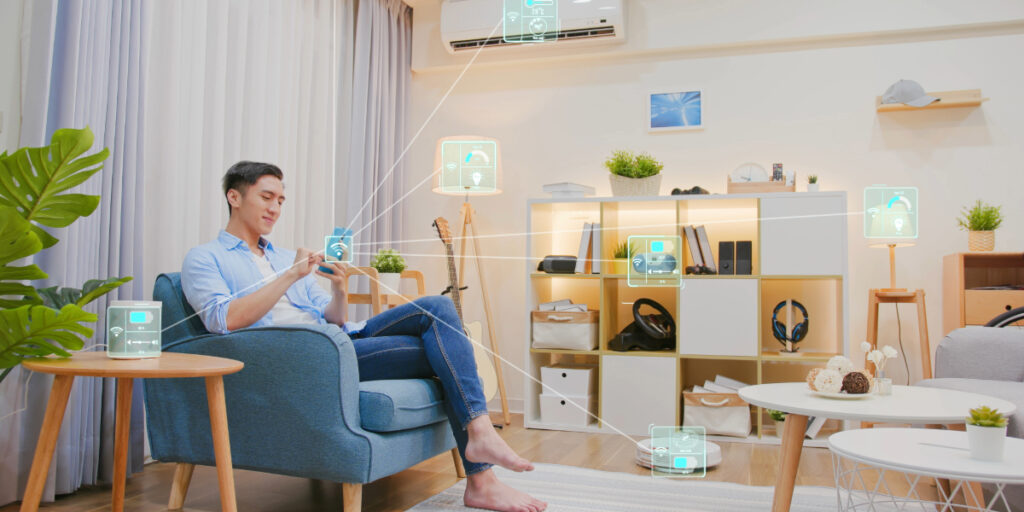In today's world, where the pace of life is fast and often stressful, finding effective stress management techniques has become key to maintaining well-being. The Internet of Things (IoT) technology opens up new opportunities in this area, offering innovative solutions that can help us achieve greater peace of mind and balance in our lives.
The main causes of stress and the importance of managing it
We live in a time when stress has become an almost integral part of our lives. Too many responsibilities, constantly connected to the digital world, and social pressures are some of the challenges we face every day. Effective stress management is crucial not only for our mental health, but also for our physical health, as uncontrolled stress can lead to a host of serious health problems.
The role of IoT devices and applications in reducing stress
IoT Devices, such as smart watches and fitness trackers play a key role in modern stress management. Not only do they monitor our health, but they also act as interactive assistants, helping us manage stress on a daily basis. For example, some smartwatches can detect increased stress levels in real time and automatically suggest breathing exercises or short meditations.
What sets these devices apart is their ability to personalize the user experience. Based on the data collected, such as heart rate, sleep quality, or physical activity level, these devices can tailor their recommendations to best meet the individual user's needs.
In addition, integration with health apps and wellness platforms allows you to more fully use the capabilities of the Internet of Things. For example, users can combine data from their devices with meditation apps or apps for tracking diet and exercise, allowing for a comprehensive approach to stress management.
In this way, IoT devices not only provide valuable data, but also support the daily pursuit of better health and mental health.
Scientific evidence for the effectiveness of IoT
Current scientific research confirms the effectiveness of IoT devices to help people cope with stress. For example, analyzing biometric data collected by smartwatches can reveal stress-related patterns, such as heart rate variability or sleep quality. This information can help you identify specific stress triggers and, as a result, develop more targeted stress management strategies.
In addition, research shows that regular use of the relaxation features available in IoT devices, such as meditation or breathing exercises, can lead to long-term improvements in well-being and lower stress levels. By providing both direct stress management tools and long-term data for analysis, these devices play a vital role in improving the quality of life.
Integrating IoT technologies into everyday life
Integrating IoT technology into your daily life may seem daunting, but it's actually easier than you might think. We can start with small steps, such as wearing a smartwatch that tracks our physiological responses, or installing mobile apps that help with organization and time management, which can also help reduce stress levels.
Integrating IoT technology into everyday life doesn't have to be difficult. Here are some simple steps you can take::
- Wearing A SmartwatchQuestioner : This simple action can provide valuable information about our physical health and stress responses.
- Installing Mobile Apps: Time management or meditation apps can help you organize your day and reduce your stress levels.
- Automating Homework Assignments: Smart home devices can help you manage your daily activities, which also helps reduce stress.
- Communication and control: Using the app for remote control of household appliances can increase the sense of control and comfort.
- Sleep Quality Monitoring: Smart mattresses or sleep monitoring devices can help optimize your sleep quality, which is crucial for managing stress.
- Intelligent Lighting: Automatically adapted to the user's needs, lighting systems can create an environment that promotes relaxation and tranquility.
- Personal Voice Assistants: Using voice assistants to manage everyday tasks can also help reduce stress by optimizing the organization of the day.
- Intelligent Plant Irrigation Systems: Automatic plant care systems can benefit both plants and our well-being by limiting responsibilities and bringing an element of nature to our surroundings.
Each of these steps can be the beginning of a path to better stress management and improved overall well-being.
Future trends in IoT
The development of IoT technologies opens up new horizons in the field of stress management. Here are some projected trends::
- Improved monitoring accuracyFuture IoT devices will monitor health parameters such as stress levels and sleep quality even more precisely, thanks to advanced sensors and algorithms.
- Personalization on an individual level: Devices will be able to adapt their recommendations even better to the individual needs of the user based on the analysis of the collected data.
- Integration with health services: We can expect better integration of IoT devices into healthcare systems, which will allow for a more integrated approach to mental health management.
- Interactive Intervention: IoT devices will be able to offer interactive intervention methods during times of increasing stress, for example by offering immediate relaxation exercises.
- Artificial intelligence in stress management: The use of AI to analyze data and suggest personalized coping strategies will become increasingly common.
Resume
IoT technology has great potential to help us manage stress and improve our well-being. By consciously using these state-of-the-art tools, we can improve the quality of our lives, achieving greater peace and balance. As these technologies evolve, we can expect even greater opportunities in this area.







